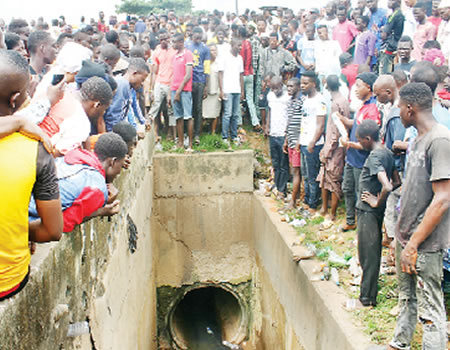
LAST week, there were shock waves across the nation as cases of the discovery of kidnappers’ dens in parts of Lagos metropolis surfaced in the media. On Tuesday, the Lagos State police command arrested seven suspected ritual killers following the discovery of an underground kidnappers’ den at Obadeyi in Ijaye area of the state. As revealed by the state Commissioner of Police, Mr Fatai Owoseni, the dungeon was discovered through the joint efforts of security agents and members of the public. The den was reportedly discovered after a highway sweeper with the Lagos State Waste Management Agency (LAWMA) raised the alarm when she heard the voice of a woman calling for help from the canal.
In the process, Owoseni said, people moved in to help and noticed that some persons who had things resembling gourds in their mouths tried to escape and that made the crowd to suspect something unusual. Two of those caught were set ablaze by the mob before the arrival of the police at the scene. Items including clothes, underwear, identity cards and wigs of people suspected to have been victims of ritual killing were discovered at an abandoned house near the canal reportedly used as a hideout by the suspects. Surprisingly, while the news of a suspected kidnappers’ den in the Ijaiye was still raging, Lagos residents learnt of another hideout of suspected kidnappers in Ile-Zik, near Ikeja.
Cases of underground dens as sites of dark practices are not new in the country. It will be recalled that in the Soka area of Ibadan, the Oyo State capital, the discovery of a ‘forest of horror’ on March 22, 2014 took the nation by storm. Chanced upon by a motorbike rider, the forest had over 20 decomposed human bodies and hundreds of human skulls, and more than 20 people were rescued from it. Behind the Ibadan and Lagos cases, as indeed those discovered in other parts of the country, is the desire for illicit wealth by misguided individuals in the Nigerian society, and these individuals are unfortunately in large numbers.
Besides, the family system, a primary agency of socialisation, has all but collapsed. It has succumbed to the ravages of the times and pernicious ideas are now embraced with vigour if they promise sudden wealth. Sadly, popular culture, particularly the ubiquitous ‘home videos’, consciously and relentlessly promotes demonism. The films that Nigerians watch in their leisure hours convey the impression of unrestrained fascination with bygone ages, and are almost always pernicious in their messages. The damage done to the Nigerian society by those who inhabit this aspect of the national life, particularly to the nation’s youths, is huge. We therefore call for caution and reorientation among Nigerians on societal values, culture and tradition. In this regard, the various arms of government, the educational sector, the media, religious organisations and other critical sectors of the Nigerian society must rise up to the task of instilling positive values in the populace.
Another critical issue that must be addressed is the public reaction to discoveries of kidnappers’ dens. Almost in all cases, those suspects are either burnt or clubbed to death and it often takes the prompt intervention of the police to arrest the dastardly situation. We believe that a mob, ruled by its muscles rather than its intellect, should never be allowed to replace the institutions saddled with law enforcement and the administration of justice in the country. Despite all the criticisms that may be leveled against them, it is still the job of the police to determine who has committed the crimes of kidnapping and ritual killing, and to initiate the process for prosecution. If the police are failing in their duties in this regard, it is this failure that must be addressed, rather than carrying on as if Nigeria has a duty to remain a jungle.
With regard to the current cases, we commend CP Owoseni and his men for their prompt response to the public alert on the ritualists’ dens in Lagos. We urge them to conduct a thorough and impartial investigation into the cases and ensure that those deserving of prosecution in the court of law are treated accordingly. Nothing sends a clearer message to ritual killers than swift prosecution and conviction in the court of law.
END

Be the first to comment